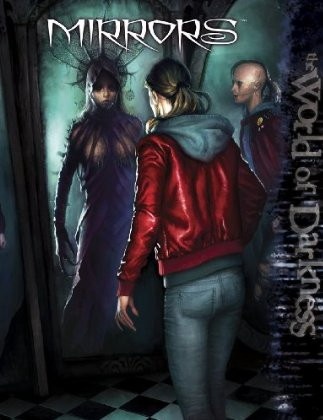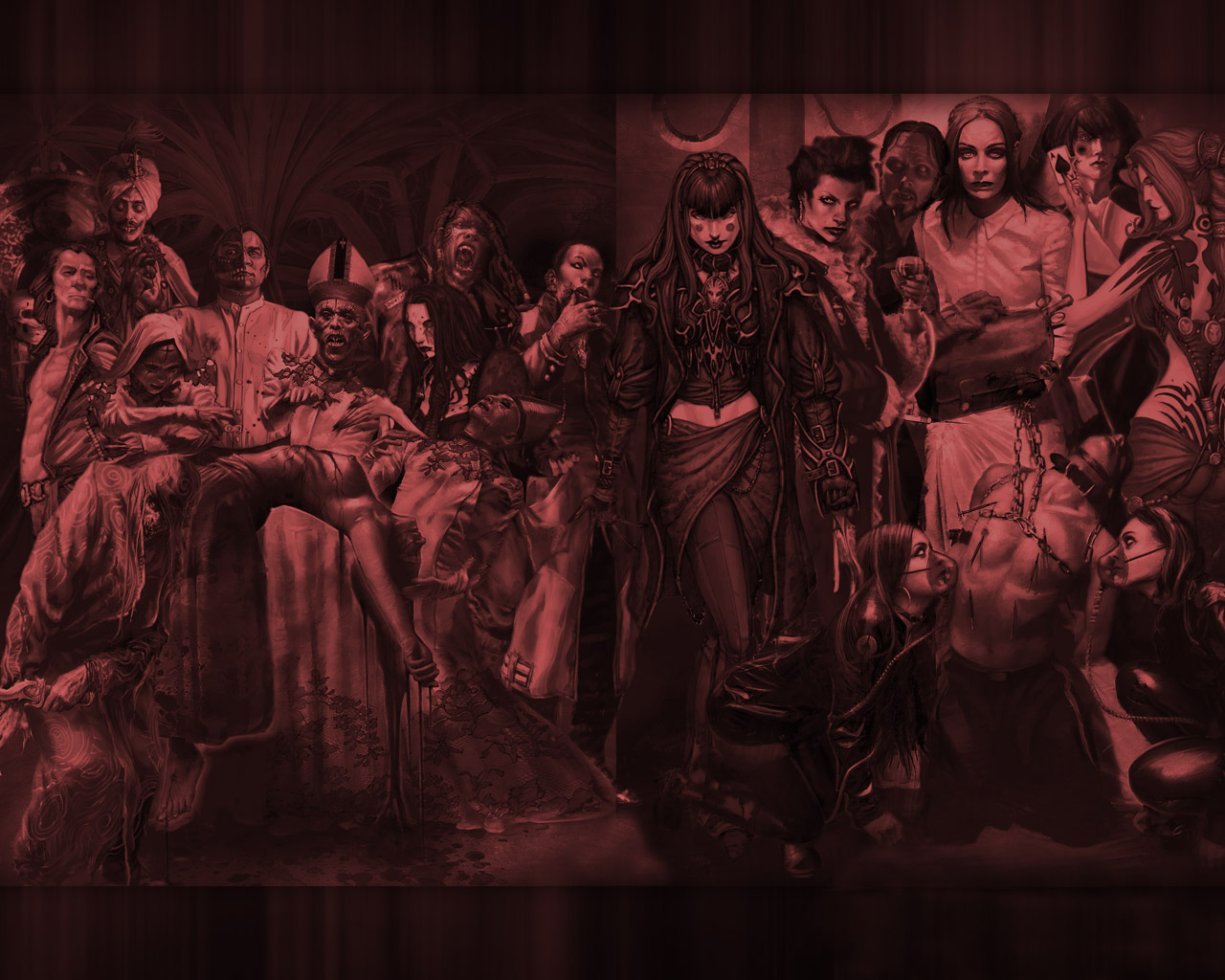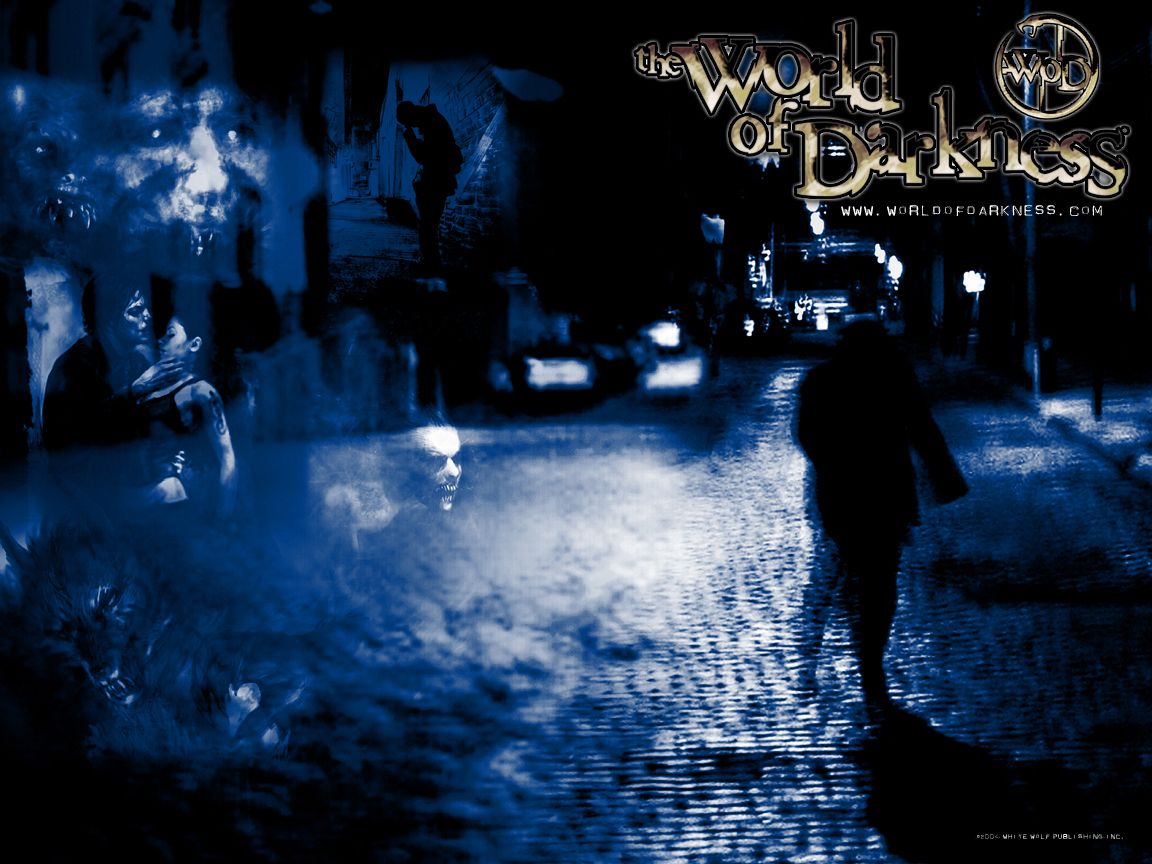The World of Darkness is largely famous for the game Vampire: The Masquerade, but I think that is just the tip of the iceberg, a mere glimmer of potential. White Wolf, the company who publishes the World of Darkness, rebooted the setting to be more open ended and cogent, as well as more mathematically feasible — there were persistent statistical anomalies in the so-called “Old World of Darkness” that the “New World of Darkness” fixed. The company tried new paradigms of RPG publishing, pushing both core products and a range of limited series, allowing small ideas room to flourish without requiring that they continue in a “publish or perish” fashion. A really nice idea…but all this is beside the point. Despite the fact that the World of Darkness is ostensibly a modern setting populated with an urban horror edge, I think the framework of the system is great when adapted to running a fantasy game. I use the World of Darkness’ Storytelling System as the mechanics for my fantasy roleplaying campaign, and you should too.
1.) One Book is Enough for Most Players
 Once you buy The World of Darkness you are good to go; you can spin out an infinite number of characters out of just the one book. Sure, there are sourcebooks with merits galore, but they are truly optional; because the system is elegant and open-ended, all you need is the core book. Heck, if you run a Low Magic or Gritty campaign, you could easily run the game with just The World of Darkness book. Dice-wise, the system uses ten-sided dice, but you probably already have a whole mess of d10s, don’t you?
Once you buy The World of Darkness you are good to go; you can spin out an infinite number of characters out of just the one book. Sure, there are sourcebooks with merits galore, but they are truly optional; because the system is elegant and open-ended, all you need is the core book. Heck, if you run a Low Magic or Gritty campaign, you could easily run the game with just The World of Darkness book. Dice-wise, the system uses ten-sided dice, but you probably already have a whole mess of d10s, don’t you?
For storytellers or players who want to pursue a path towards supernatural characters, I recommend Vampire: The Requiem as a good purchase, since the supernatural powers are eerie and well balanced; Promethean: The Created, Werewolf: The Forsaken and Hunter: The Vigil all have some interesting options as well. For those inclined to tinker and explore fringe options, I can’t recommend Mirrors highly enough; it is The World of Darkness’ version of Unearthed Arcana and filled with a host of great optional rules.
2.) The Character Sheet is Only One Page, Single Sided.
I’m a believer that game rules are the little white lies of the hobby. They are a necessary evil that create randomization and can in the right circumstances help describe the logic of the characters and setting, but left unchecked they can swallow a session right up. Rules are best when acknowledged but glossed over, bumps in the road that help the story move right on. The last thing you want is someone floundering with pages of abilities or spells, flipping open a book to consult opaque mechanics, trying to crunch the math in their head. The World of Darkness has an “Attribute + Skill” system that is intuitive and a snap to use. Roll a number of dice equal to your relevant Attribute to the relevant Skill, add any dice for items or circumstances, subtract any dice for penalties, and roll.
3.) A Few Quick Tweaks to the Skills Will Make Any Setting Workable.
Now, I’m not claiming that you can just pick up The World of Darkness and just run with it out of the box, not entirely. You’ll have to make changes, but we’re talking some pretty minor ones; mostly, you’ll have to substitute a couple of skills for something else. “Computers” is a modern skill that won’t come up in a lot of fantasy games, for instance. Personally, I replaced it with “Mechanics,” since between Rube Goldbergian traps, siege weapons and mysterious ancient machines, there are plenty of things you could call “mechanical” and fiddle with. “Firearms” is another big offender; guns are always a contentious subject in a fantasy setting. I recommend taking off “Weaponry” and Firearms both and replacing them with “Melee” and “Ranged,” respectively. Some games might have a problem with “Streetwise,” I suppose, but if you think about Lankhmar, Waterdeep, Zobek or even historical metropolises like Rome or Alexandria, there is plenty of room for thieves’ guilds and skullduggery. Game Masters — my favorite trick is to look for unlikely Attributes and Skill combinations. Strength and Mechanics to fix the rune giant’s rusted cuckoo clock or Intelligence plus Socialize to make friends with the hyper-intelligent brain-elves, that sort of thing.
4.) Merits Allow Rules Wonks to Go Nuts While Keeping Complicated Rules Optional.
Some players like being able to complicate their character. It is all well and good to rely on abstractions and description up to a point, but there are people who like mathematical options, who like seeing a concrete ability like “Disarm” on their character sheet. It helps anchor their conception of the character. The World of Darkness has Merits to give that stripe of player what they want. You can learn a combat style like Kung-Fu and get special maneuvers…and be balanced with a player who wants to be good at martial arts but avoids the complex rules by putting their experience into just the skill “Brawl.” Players who don’t want to be swamped with ad hoc mechanics can focus on more conceptual Merits. World of Darkness gives you the best of both worlds.

5.) The Combat System is Quick, Gritty and Evocative.
I know a lot of gamers have “hit point fatigue.” I mean, they have become the industry standard despite being…fairly poor mechanics for approximating health or injury. The Storytelling System is much more realistic, but not quite a “simulationist” approach; there are no crit tables or location charts, just a scale based on your size and toughness with wound penalties at one end. There are three types of damage — bashing, lethal, and aggravated — which allows a big range of harm and healing. You can get over a fist fight pretty quickly, but if you get really hurt it can take weeks and even months to heal. Getting poked with a big pointy sword is something you’ll want to avoid; the average hit won’t kill you outright but it won’t be something your character can just ignore. Because of the aforementioned abstraction and optional rules, fights resolve quickly and rely on the players and the narrator’s inventiveness and imagination…which is the best part of combat, if you ask me. Supernatural creatures are terrifying and supernatural powers are weird. Heroes are pitted against incredible odds and actually risk life and limb.
6.) The Humanity System Makes a Great All-In-One Sanity and Alignment System.
Alignment systems can be troublesome, but they do offer a built-in way of marking a character’s often nebulous ethical position. Humanity — or Morality, as they call it in the core book, though I prefer “Humanity” — presents an easy way to show where the character is, psychologically. Hack and slash fantasy gaming makes it easy to forget that exploring a dungeon and killing some orcs is…the same thing as having strangers break into your home and murder you, from the orc’s perspective. Morality provides a nice benchmark system for how rationalization can result in a PC who sees no problem with a little pre-emptive genocide. It also provides the mechanics for pulling a Lady Macbeth if and when the guilt overwhelms you. As a bonus, if you tilt it on its side? and start making characters roll Humanity — sorry, Morality — when they confront your campaigns Call of Cthulhu-esque horrors? You can use the derangement system as a SAN check, too.
Mordicai Knode was going to call this post “A Connecticut Yankee in The World of Darkness” as a spoof on his non-satirical “A Modest Proposal for Increased Diversity in D&D” post, but it wasn’t really all that funny. He totally uses the Storytelling System to run his Weird Fantasy campaign. Follow him on Twitter and on Tumblr if you want to know more.










